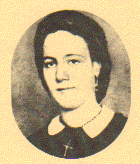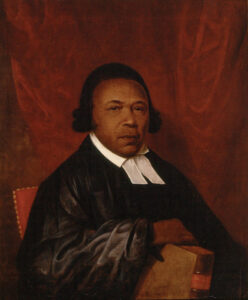Whether or not you missed us this weekend is immaterial. Because we're back! This week we'll be finishing up the opening Round of 32 and kicking off the Saintly Sixteen on Thursday.
Today Henriette Delille faces Absalom Jones, as two modern(ish) American saints go head-to-head.
In case you missed the Friday results, Benedict the Moor defeated Nino of Georgia 68% to 32%. He'll face Euphrosyne in the next round. Now go vote!
Henriette Delille
 Henriette Delille (1813-1862) had a very specific education. She was the Creole daughter of a freed woman and a European father in New Orleans. Her parents had a common-law marriage under the plaçage system. In this system, European men entered into a common-law marriage with women of color. When the man became financially established, then he would marry a white woman. There was an understanding that he would continue to provide food, shelter, and education for children of the common-law marriage.
Henriette Delille (1813-1862) had a very specific education. She was the Creole daughter of a freed woman and a European father in New Orleans. Her parents had a common-law marriage under the plaçage system. In this system, European men entered into a common-law marriage with women of color. When the man became financially established, then he would marry a white woman. There was an understanding that he would continue to provide food, shelter, and education for children of the common-law marriage.
Henriette lived in the French Quarter, and she was groomed to follow in her mother’s footsteps and expected to marry a European man in New Orleans society. As a young woman, her mother educated her in literature, music, medicine, and dancing. Henriette wore fine gowns and made her rounds at the balls, while her mother hoped that she would make a match that would increase their family’s security.
When Henriette was a teenager, she gave birth to two sons. Both of them died at a young age. Henriette also began to teach at the local Catholic school for girls of color. During this time, her dedication to the poor in the city grew, and she began to question the plaçage system.
While her mother tried to entice Henriette with the trappings of New Orleans society, children in poverty captured Henriette’s attention. While the family tried to educate her so that she would be accepted in higher classes, she used her knowledge to educate slaves, even when the law prohibited their education. Henriette’s brother urged her to stop working with the Creole community, because it highlighted the family’s identity as formerly enslaved. While her family’s property was supposed to establish her family in New Orleans’ society, Henriette Delille used it to educate, care, and shelter.
Eventually, Henriette Delille found her identity in another family. She started the order of the Sisters of the Holy Family that was made up of free women. They provided nursing care for the elderly and a home for orphans. The order grew after Delille’s death, and the parochial schools that the order founded became instrumental in educating children in the Jim Crow South.
Collect for Henriette Delille
Almighty God, You gave to your servant Henriette special gifts of grace to understand and teach the truth as it is in Christ Jesus: Grant that by this teaching we may know you, the one true God, and Jesus Christ whom you have sent; who lives and reigns with you and the Holy Spirit, one God, for ever and ever. Amen.
Absalom Jones
 Absalom Jones was born in Sussex, Delaware, in 1746. After being sold to a farmer, that owner sold Absalom’s mother and the rest of his family to another slaveholder and moved with Absalom to Philadelphia, Pennsylvania, when Absalom was sixteen. Absalom’s owner was a member of Christ Episcopal Church, and when Absalom met and married his wife Mary, the priest of Christ Church married them in 1770.
Absalom Jones was born in Sussex, Delaware, in 1746. After being sold to a farmer, that owner sold Absalom’s mother and the rest of his family to another slaveholder and moved with Absalom to Philadelphia, Pennsylvania, when Absalom was sixteen. Absalom’s owner was a member of Christ Episcopal Church, and when Absalom met and married his wife Mary, the priest of Christ Church married them in 1770.
Because children took the mother’s status in the colonial states, Absalom purchased his wife’s freedom so that their children would be born free. When Absalom was thirty-eight, his owner finally freed him. Absalom added Jones to his name since enslaved people were typically forced to take their owners’ names, and upon freedom, assumed their own names.
The Methodist church allowed Black people to attend and lead, and Absalom Jones and his friend Richard Allen were among the first African Americans to be licensed to preach in the 1780s. But being allowed to do something doesn’t mean being granted full authority and equality. When informed that they would be segregated to the church’s perimeter and balcony, Jones and most of the other African Americans walked out.
In 1787, Jones and Allen founded the Free African Society, an organization created to provide the African American community’s social, economic, educational, and spiritual needs in Philadelphia. The Free African Society established a strict code, including dues paid by all members to benefit those in need, mainly widows and orphans. The first African American church grew out of this organization’s commitment to Christian community and ethics. When the yellow fever epidemic hit the Philadelphia area in 1793, twenty times more Blacks than Whites helped those afflicted, thanks to The Free African Society. When the Society began to establish The African Church in 1792, Jones founded the African Episcopal Church of St. Thomas.
Ordained a deacon in 1795 and a priest in 1802, Absalom Jones was the first African American priest in the Episcopal Church. In 1973, the Episcopal Church established February 13 as the feast day for remembering and honoring Jones’ ministry and life. No matter your race or ethnicity, we’ve all been blessed by his relentless pursuit to diversify the Episcopal Church.
Collect for Absalom Jones
Set us free, heavenly Father, from every bond of prejudice and fear; that, honoring the steadfast courage of your servant Absalom Jones, we may show forth in our lives the reconciling love and true freedom of the children of God, which you have given us in your Son our Savior Jesus Christ; who lives and reigns with you and the Holy Spirit, one God, now and for ever. Amen.
[poll id="314"]
151 comments on “Henriette Delille vs. Absalom Jones”
Henriette was up against an impossible situation of virtually no choice - but she took another choice that offered greater freedom and dignity to many. Bravo. As good Episcopalians, we know all about Absalom, but we haven't heard about Henriette. I've gone for the underdog. - In addition to the books already mentioned, another novel that sheds light on the society of New Orleans end 18th-early 19th C is: Isabel Allende "Island Beneath the Sea."
This choice was a no-brainer for me. I live in Delaware, I am a cradle Methodist (I'm sorry we didn't do right by Absalom Jones and Richard Allen), and I attended Absalom Jones School in Belvedere, DE for 7th grade.
https://hsec.us/news/9398482 for factual correction Also Absalom and Mary were married at St. Peter’s. Here’s the record of the marriage of Absalom and Mary (although the annotation continues the error of him buying his own freedom)
https://www.pbs.org/wgbh/aia/part3/3h93.html
Henrietta on this International Women’s Day whose motto for this years celebration in “Courage to Challenge”. Let’s lift up this courageous woman of color!
Both worthy of my vote but since today is International Women's Day, Henriette gets my vote.
Very hard choice today! I had to go with Henriette. Love Absalom too, but he is already well recognized.
Henriette had just as much bravery......and little know of her. This is why it's called "Lent Madness"!
I am choosing Henrietta because it was much more difficult for a women to choose a path service. She showed great courage.
Not an easy choice, but since I was introduced to Absalom Jones only a few years ago here in
Lent Madness, I voted for him. But if Henriette Delille wins, I won't complain. (I'll just re-nominate Absalom again next year.)
This was very educational today. Such a tough decision between such deserving people. Of course, I'm familiar with Absolom J , but Henriette's story is fascinating. they both suffered so much and achieved so much. Blessings on them both.
Very difficult choice! However, I voted for Henriette because teaching slaves to read and write was a punishable offense and you could get 39 lashes for doing it. She was incredibly courageous. And since I just finished reading the slave narrative of Harriet Jacobs (I highly recommend this) I had to vote for Henriette and for all the women of color who had difficult choices and made selfless and courageous decisions!!
Agreed.
This one was a tough vote because both Saints strove for social justice. Henrietta got my vote because she did not let the temptation of earthly riches take her away from her “Lord of the streets” ministry to the poor and destitute. A salon of course did the very same and his distinction as the very first Episcopal priest is indeed inspiring.
Someone way up the line said they'd voted for Absolom Jones because they felt he'd touched so many more lives. I disagree. One can never know how a teacher touches lives, and founding an order of teachers means lives upon lives upon lives. Maybe not more than Absolom Jones, but maybe not fewer either.
This was a terribly hard choice today - both so worthy.
I hope in future years the SEC will consider changing the way the brackets are structured so some incredibly inspiring people don't have to eliminate each other in the first round, and we'd have a chance to read more about them in the second round. It would be so much better to have these accomplished, relatable real people matched against the shadowy, largely legendary saints of early centuries. By the second round the write-ups for those amount to creative fiction.
Both of the saints are very deserving of winning, and I too didn't really care for a lot of the black and white comments today. I voted for Henrietta due to her courage, and her diligence to live out her faith despite all the setbacks, roadblocks, and prejudicial thinking by others that she endured.
I voted for Henriette Delille today. Although also a worthy contender Absalom Jones is more well known and has already been recognized for his part in history. I like hhe unsung heroes who may havd never been heard of except for Lent Madness. Hurrah for the unknown servants!
I VOTE FOR HENRIETTE DeLILLE, BECAUSE OF HER BIRTHS DURING HER TEENAGE UP TO HER ESTABLISHING THE ORDER OF THE HOLY FAMILY WHICH PROVIDED NURSING CARE FOR THE ELDERLY, AND HOMES FOR ORPHANS, AND SCHOOLS.